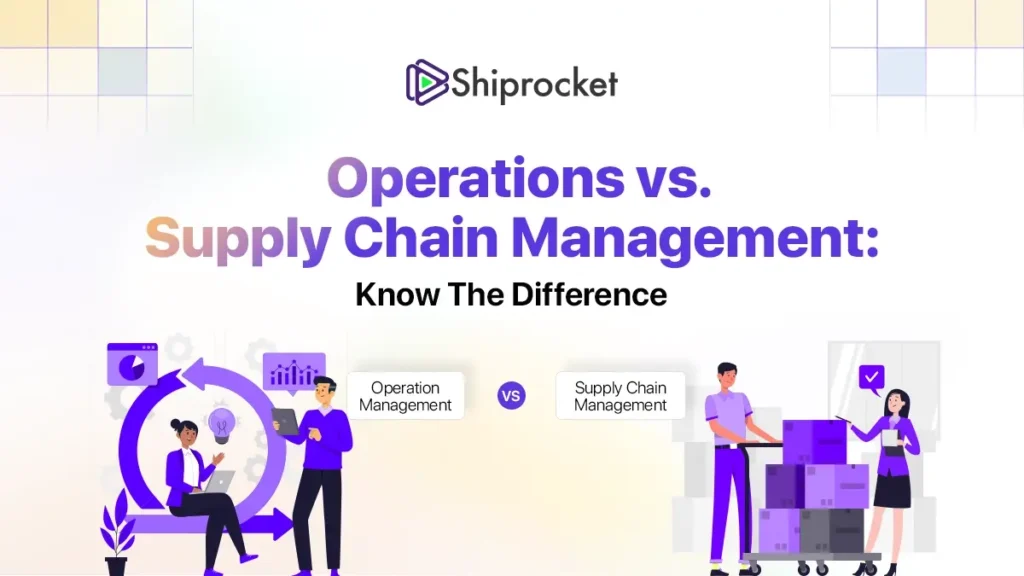Difference between Operations vs. Supply Chain Management
The journey of completing a product and dispatching it to a buyer is a lengthy and tedious process. It entails multiple external and internal processes. Different departments or companies handle every phase of this journey, with each player playing a significant role in the process. All of them handle different operations of supply chain management and operations management.
Despite many similarities, operations and supply chain management are distinct and profound roles. It is essential for any business professional to clearly understand how organisations use these two to boost productivity and efficiency, resulting in larger gains.
Let’s explore operations management and supply chain management in detail and how they differ.

What’s the Difference Between Operations and Supply Chain?
The table below highlights the difference between operations management and supply chain management.
| Supply Chain Management | Operations Management |
| Supply chain management is concerned with what happens outside the company. | Operations management is mainly concerned with whatever happens within the company. |
| It deals with obtaining materials and delivering products. | It deals with planning and overseeing how the materials obtained are being used in the manufacturing of products. |
| A supply chain manager spends time negotiating contracts and understanding suppliers. | An operations manager mainly oversees everyday manufacturing operations and work processes. |
| Supply chain activities are usually the same across all industries. | The operations processes are different and depend on the type of industry or product that is being manufactured. |
| A third-party agent can easily do supply chain management. | Operations management cannot be outsourced as the data handled can be extremely sensitive and is done by an internal employee. |
Let’s Talk About Operations Management
Operations management is an area of management expertise that handles the internal operations of a business, including maintenance of the building and equipment, manufacturing process, and ensuring the production of products and services that work efficiently to deliver orders on time.
An operations manager is responsible for the following:
- Creating efficient and productive processes and workflows to enhance the product output for the company.
- They are also responsible for budget management and staffing requirements.
- They connect and work with other managers as a team to coordinate strategies and plans for better results.
- They co-create elaborate plans and processes to reach the organisation’s goals.
- Planning and understanding what the near future might hold is their key responsibility.
For instance, an operations manager who works at a company that manufactures mobiles might realise that reorganising their assembly processes would make the work more efficient, and hence, they work with other managers to implement this change. They coordinate with SCM (supply chain management) managers to ensure that all inventory is within the budget and will be readily available for use. They also ensure the necessary staff members and operators are present to carry out this operation to meet buyer demands. Similarly, they meet other managers to create long-term plans for the company’s future.
A breakdown of different positions in operations management:
- Operations Coordinator: An operations coordinator tends to coordinate office events, provide clerical support, and improve the efficiency of the overall workflow. They are responsible for communicating with potential clients and customers.
- Operations Manager: An operations manager is the most senior person responsible for the operations domain. They are responsible for reporting to the director of operations. They oversee all the company budgets and staff and also make effective business decisions to lead the team for the future.
- Operations Analyst: An analytical professional who is simply a part of the operations team and manages all the relevant data is an operations analyst. Their primary activities are optimising workflows, data analysis, suggesting recommendations, and creating operations procedures.
- Director of Operations: Director of Operations is a position mainly available in larger businesses and organisations. Such companies tend to have a complex operations unit that takes care of a team of operations staff. A director of operations is responsible for making company-wide decisions and improving overall efficiency and productivity.
- Chief Operating Officer: A chief operating officer is an executive in larger organisations concerned with many operations on staff and resources and workflow processes. They are responsible for building performance reports and analysing relevant data while creating business strategies. They are responsible for managing overall goals and profits.
Breaking Down Supply Chain Management
Supply chain management (SCM) is a collective effort by suppliers to develop a centralised management system for the flow of goods and services. It includes efficient and economical processes that transform raw materials into finished products. SCM is based on the idea that nearly every product comes into the market and generates income.
57% of organisations believe that SCM gives them a competitive edge, enabling them to expand further in the industry. It is made from the efforts of different organisations and involves more than simply inventory and logistics. In SCM, all the coordination of logistics processes is handled by the supply chain manager.
An SCM system consists of five parts:
- Planning: The best SCM practices begin with meticulous and diligent planning. The entire process is planned such that all consumer demands are met while they also forecast future trends accurately. All the raw materials needed during every stage of manufacturing and assembly, along with the staffing needs, are considered beforehand. ERP (enterprise resource planning) systems are also utilised to create these aggregate plans.
- Sourcing: Relationships with suppliers and logistics agents are crucial to SCM processes. When good and strong relationships are established with suppliers in advance, the chances of a halt or delay in the supply chain processes are reduced. In a nutshell, supply chain processes mainly include ensuring that:
- All the raw materials procured meet the needed standards and specs.
- All the costs paid for the procured inventory are in line with market expectations
- The supplier is reliable and flexible enough to deliver emergency materials even in cases of unforeseen events
- Manufacturing: The manufacturing segment of the SCM process forms the heart. It transforms the raw materials sourced with the help of machinery, labour, and other forces to create the end products. Despite the manufacturing stage being the biggest goal, it does not form the final SCM stage. The manufacturing process is subdivided into inspection, quality control, testing, packing, etc. Being mindful during manufacturing is vital to avoid waste and deviations from the overall process.
- Delivering: Products are ready for sale after manufacturing and assembling. The distribution process is mostly an act that aids brand recognition, especially when the customer is new. Strong SCM processes offer robust logistics capabilities and delivery channels that promise timely, efficient, secure, and reasonable product deliveries.
- Returning: The final stage of SCM processes includes returns. This stage is also accompanied by product support. A consumer returning a product is a negative, even worse when the manufacturer is at fault. The return process is termed reverse logistics; every manufacturing company must have a returns facility.
On the bright side, returns form an interaction between the consumer and the manufacturer. It provides the manufacturer with valuable insights about how they can improve. Hence, they can be used to optimise the SCM processes effectively.
How does Supply Chain Management Play a Crucial Role in Operations Management?
Both supply chain and operations management help in adding value to a business. They both drive efficient processes and increase revenue for a company. With those objectives in mind, the two roles are largely interlinked.
- SCM handles the process of enabling the product to be produced, and operations management oversees the operations behind that production.
- Several domains need supply chain management and operations management irrespective of the business moving service, raw materials, data, or money in the hands of the customer.
- In smaller businesses, these roles tend to overlap and can be completed by a single person or department. The skills involved in both these processes are similar and can be completed by the same department.
- Decision-making, organisation, goal-setting, communication, and cross-functional leadership are the major responsibilities that these two functions share.
Conclusion
Supply chain management and operations management are two aspects of manufacturing businesses that enable order fulfillment. Although these functions have several similarities, they differ in many aspects. The first forms an external lens, while the latter uses an internal lens to govern the manufacturing processes. Supply chain and operations management are equally responsible for ensuring smooth, efficient workflows and processes. Regarding larger organisations, the SCM processes become a part of the operations management processes. However, in smaller businesses, they come under the same umbrella.
Yes, supply chain management comes under operations management. Supply chain management refers to the management of the flow of information from suppliers to customers. It helps you maximise supply chain efficiency.
The three main areas of operations management and supply chain management include purchasing, planning, and logistics.
Yes. Operations management and supply chain management are characterised by unique features, benefits, and challenges, depending on the business sector.









